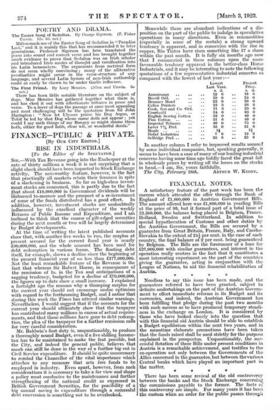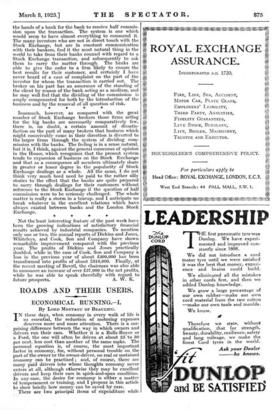FINANCIAL NOTES.
A satisfactory feature of the past week has been the success which attended the offer through the Bank of England of £1,800,000 in Austrian Government Bills. The amount offered here was £1,800,000 in yearling Bills at the price of 98, but it formed part of a total issue of £3,500,000, the balance being placed in Belgium, France, Holland, Sweden and Switzerland. In addition to special hypothecation of Customs and other duties by the Austrian Government, the Bills are secured by a guarantee from Great Britain, France, Italy, and Czecho- Slovakia to the extent of 24i per cent. in the case of each country, the final balance of 2 per cent. being guaranteed by Belgium. The Bills are the forerunner of a loan for £27,000,000 with similar guarantees, and interest in the operation really centres in the fact that it constitutes a most interesting experiment on the part of the countries giving the guarantee, acting in conjunction with the League of Nations, to aid the financial rehabilitation of Austria. * Needless to say this issue has been made, and the guarantees referred to have been granted, subject to definite undertakings on the part of the Austrian Govern- ment to effect immediate reforms in its Budget and its currencies, and indeed, the Austrian Government has been fulfilling that pledge during the past two months with such success as to have produced temporary steadi- ness in the exchange on London. It is considered by those who have looked closely into the question that with this financial aid Austria should be able to establish a Budget equilibrium within the next two years, and in the meantime elaborate precautions have been taken that the funds raised shall be used strictly for the purpose explained in the prospectus. Unquestionably, the suc- cessful flotation of these Bills under present conditions in Austria is a remarkable achievement, and testifies to the co-operation not only between the Governments of the Allies concerned in the guarantee, but between the various Central banks which have played an important part in the matter.
* * * * There has been some revival of the old controversy between the banks and the Stock Exehwnge concerning the commissions payable to the former. The facts of this controversy are simple. For many years it has been the custom when an order for the public passes through * * * the hands of a bank for the bank to receive half commis- sion upon the transaction. The system is one which would seem to have almost everything to commend it. The many investors who are not in direct touch with the Stock Exchange, but are in constant communication with their bankers, find it the most natural thing in the world to take from their banks counsel with regard to a Stock Exchange transaction, and subsequently to ask them to carry the matter through. The banks are able to give the order to a firm likely to ensure the best results for their customer, and certainly I have never heard of a case of complaint on the part of the investor for whom the transaction is carried out. The broker on his part has an assurance of the standing of the client by reason of the bank acting as a medium, and he may well feel that the dividing of the commission is amply compensated for both by the introduction of the business and by the removal of all question of risk. * * * * Inasmuch, however, as compared with the great number of Stock Exchange brokers those firms acting for the big banks are necessarily comparatively few, there is, no doubt, a certain amount of dissatis- faction on the part of many brokers that business which might conceivably come in their direction is diverted to the larger firms through the system of dividing com- mission with the banks. The feeling is in a sense natural, but it is, I think, against the general consensus of opinion in the House, which recognizes that the present system tends to expansion of business on the Stock Exchange and that as a consequence all members ultimately share in greater or lesser degree in the popularity of Stock Exchange dealings as a whole. All the same, I do not think very much heed need be paid to the rather silly stories to the effect that the banks are quite prepared to carry through dealings for their customers without reference to the Stock Exchange if the question of half commission were to be seriously challenged. The whole matter is really a storm in a teacup, and I anticipate no break whatever in the excellent relations which have always existed between banks and the London Stock Exchange.
Not the least interesting feature of the past week have been the growing indications of satisfactory financial results achieved by industrial companies. To mention only one or two, the annual reports of Dickins and Jones, Whiteleys, and Cook, Son and Company have shown remarkable improvement compared with the previous year. The profits of Dickins and Jones practically doubled, while in the case of Cook, Son and Company a loss in the previous year of about £400,000 had been transformed mto profits of about £816,000. Finally, at the recent meeting of Bovril, the chairman was also able to announce an increase of over £57,000 in the net profits, while he was able to speak cheerfully with regard to











































 Previous page
Previous page